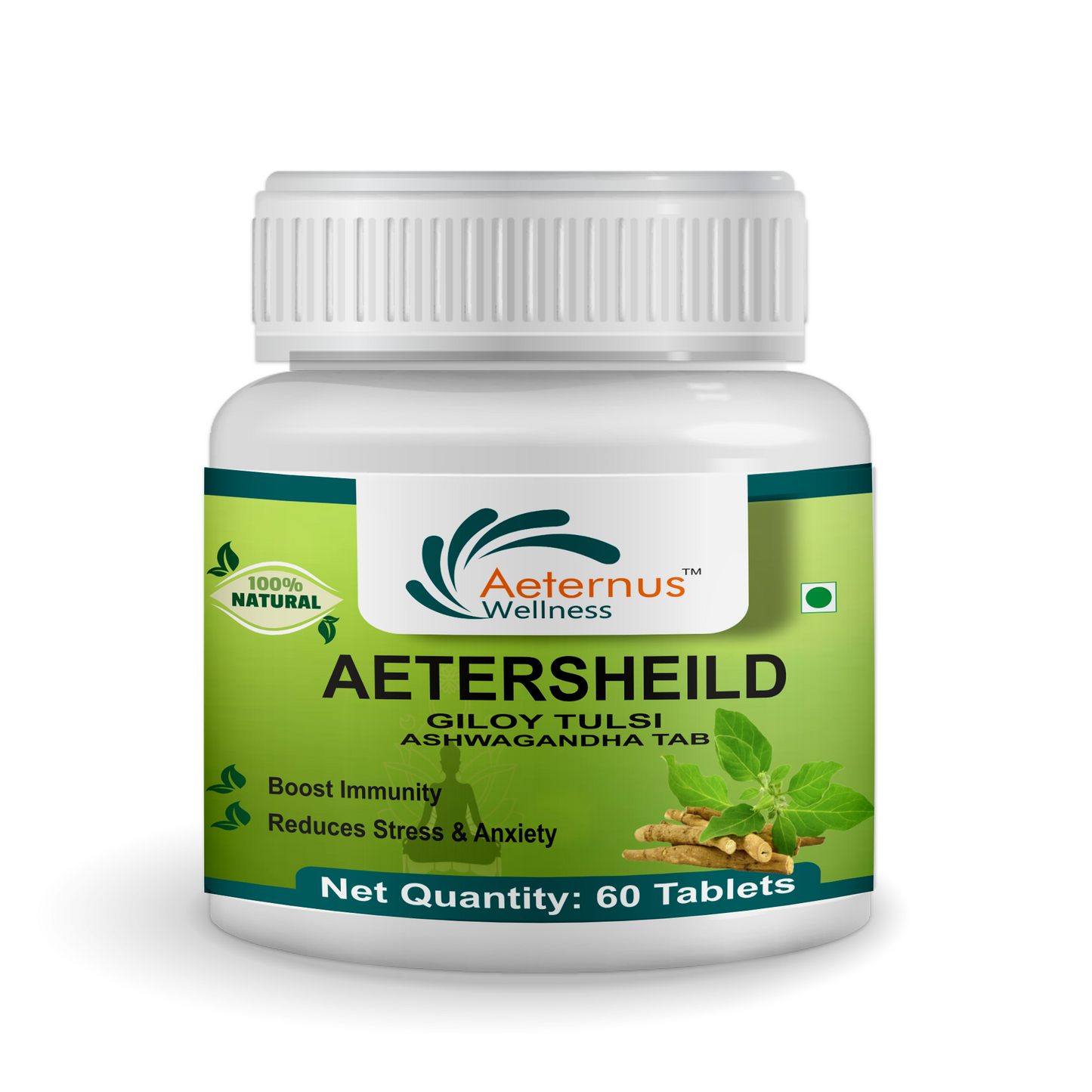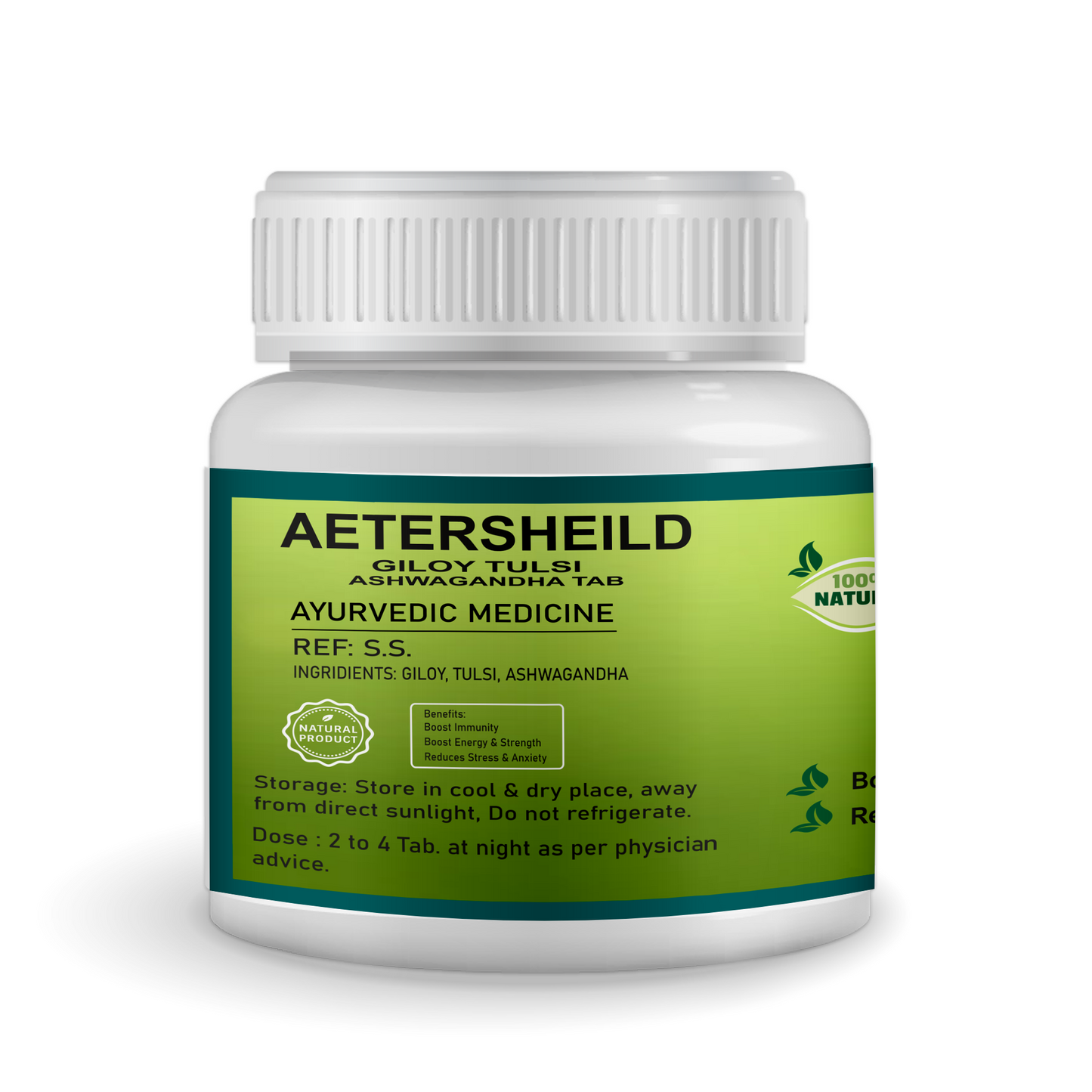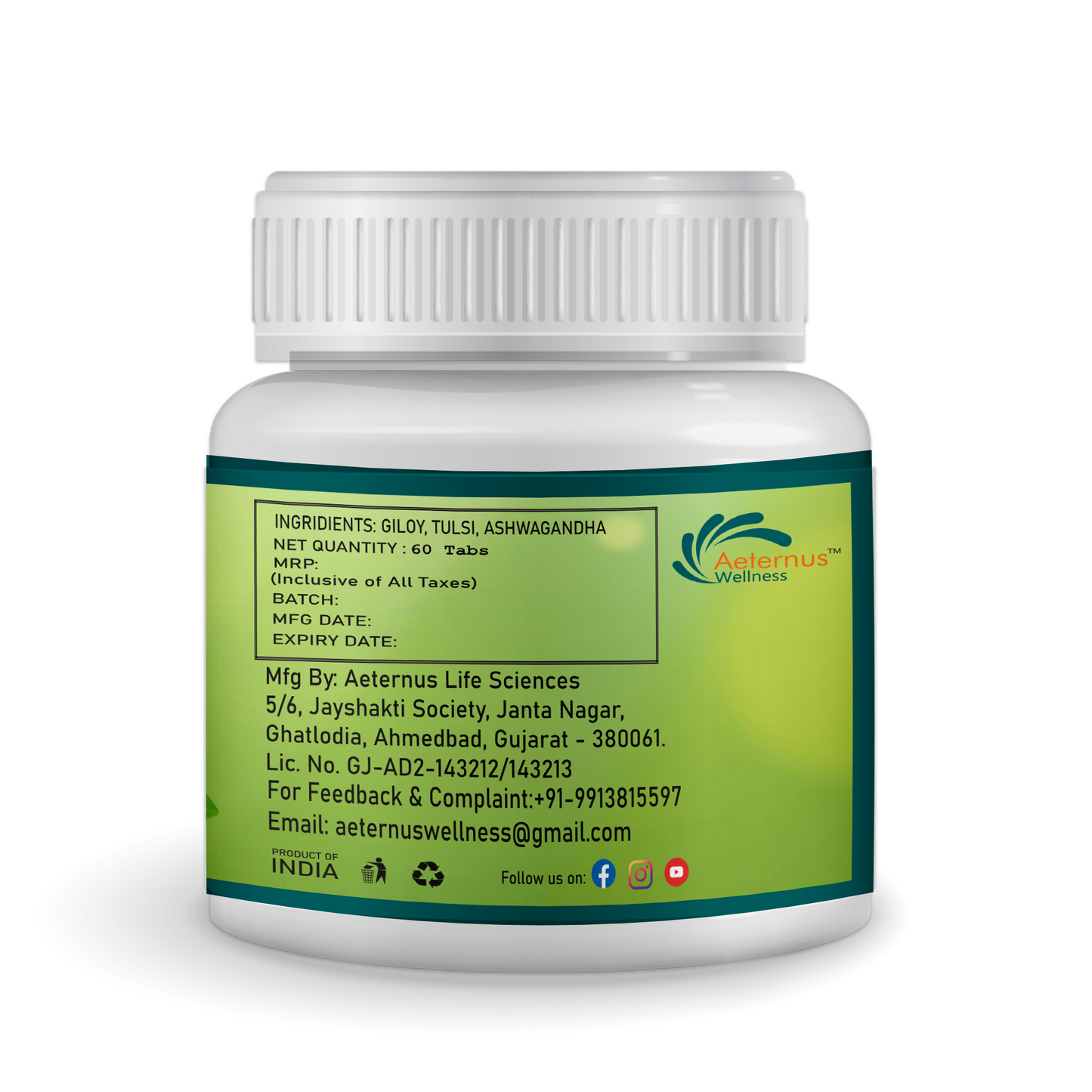Aeternus Life Sciences
Aeternus Wellness Aetersheild | Giloy Tulsi Ashwagandha Tablets, 60 Tablets | Pack of 2 (Pack of 2)
Aeternus Wellness Aetersheild | Giloy Tulsi Ashwagandha Tablets, 60 Tablets | Pack of 2 (Pack of 2)
Couldn't load pickup availability
Order Over Rs.499/- For Free Delivery.
![]()

Introducing our AETERSHIELD Tablets, a powerful blend of SIX different incredible herbs known for their numerous health benefits. This carefully crafted herbal supplement combines the goodness of Giloy, Tulsi (Holy Basil), Ashwagandha, gorakhmundi ,vidarikand creating a potent formula to support overall well-being.
Giloy, also known as Guduchi or Tinospora Cordifolia, is a renowned herb in Ayurveda, the ancient Indian system of medicine. It is known for its immunomodulatory properties, which help strengthen the immune system, promoting better resistance against infections and diseases. Giloy is also considered a potent antioxidant, helping to fight free radicals and protect the body's cells from damage.
Tulsi, or Holy Basil, is another revered herb in Ayurveda, cherished for its adaptogenic properties. It is known to support the body's natural stress response, helping to reduce stress and anxiety levels. Tulsi is also considered an excellent detoxifier, aiding in the elimination of toxins from the body, and supporting respiratory health.
Ashwagandha, also known as Indian Ginseng, is a powerful adaptogenic herb widely used in traditional medicine. It helps promote overall vitality and strength by supporting the body's ability to adapt to various stressors. Ashwagandha is also known to support healthy brain function, promote restful sleep, and contribute to balanced energy level
Gorakh Mundi: An Ayurvedic Perspective
Gorakh Mundi is an important herb used in traditional Ayurvedic medicine for various therapeutic purposes. Below, I provide detailed information about Gorakh Mundi, focusing on its Latin name, traditional name, traditional description, and modern research.
1. Latin Name:
Latin Name: Clerodendrum infortunatum
- Family: Lamiaceae (formerly Verbenaceae)
2. Traditional Name:
Traditional Name:
- Gorakh Mundi (Hindi)
- Gorakh Mundi or Gorakhmundi is the common name in many parts of India and is used widely in Ayurvedic texts.
- Other regional names include Kailashpati and Vishnukranta.
3. Traditional Description:
Gorakh Mundi is a shrub found across the Indian subcontinent, particularly in the tropical and subtropical regions. It is often regarded as a medicinal plant used for a variety of ailments in traditional Ayurvedic medicine.
-
Plant Characteristics:
The plant is a small to medium-sized shrub, reaching a height of about 1–3 meters. It has large, ovate leaves with a rough texture and white or pale blue flowers, which grow in bunches. It typically thrives in open and semi-shaded areas, including forests and roadsides. -
Traditional Ayurvedic Uses:
Gorakh Mundi has been used for centuries in traditional Ayurvedic medicine. Its primary uses include:- Pain relief: It is known for its analgesic (pain-relieving) properties.
- Anti-inflammatory: Used to reduce swelling and inflammation.
- Antioxidant: The plant is believed to have properties that help neutralize free radicals in the body.
- Antimicrobial: Used for treating skin diseases, wounds, and infections.
- Stimulant: It has been traditionally used as a stimulant to boost energy levels and overall vitality.
- Respiratory Health: It is used in the treatment of asthma, cough, and other respiratory disorders due to its soothing and expectorant qualities.
-
Part Used:
The whole plant, including the roots, leaves, and flowers, is used in Ayurvedic formulations. However, in most cases, the leaves are more commonly employed in medicinal preparations.
4. Modern Research on Gorakh Mundi:
In recent years, modern research has begun to validate some of the traditional uses of Gorakh Mundi (Clerodendrum infortunatum), particularly its medicinal properties. While it remains understudied in some areas, here are the key findings based on scientific studies:
Anti-inflammatory and Analgesic Effects
Modern studies have confirmed that extracts from Gorakh Mundi exhibit significant anti-inflammatory and pain-relieving properties. A study published in the Journal of Ethnopharmacology found that Clerodendrum infortunatum exhibited inhibition of cyclooxygenase (COX) enzymes, which are involved in the inflammatory pathway. This suggests its potential for managing conditions like arthritis and other inflammatory diseases.
Antioxidant Properties
A study in the Asian Pacific Journal of Tropical Biomedicine examined the antioxidant properties of Gorakh Mundi. The researchers found that various compounds in the plant exhibited strong free-radical scavenging activity. This supports its traditional use as an antioxidant, which can help protect the body from oxidative stress and reduce the risk of chronic diseases like cardiovascular disease and cancer.
Antimicrobial and Antifungal Activity
A research article published in Phytotherapy Research investigated the antimicrobial properties of Gorakh Mundi. The study found that extracts from the plant have significant activity against a range of bacterial and fungal strains. This supports its use in treating skin infections, wounds, and other microbial conditions in traditional medicine.
Antidiabetic Potential
Recent pharmacological studies have suggested that Clerodendrum infortunatum may have antidiabetic effects. It has been shown to reduce blood glucose levels in animal models, which may provide insight into its potential role in managing type 2 diabetes. Some studies hypothesize that its bioactive compounds may enhance insulin sensitivity and regulate glucose metabolism.
Hepatoprotective Properties
Several studies have explored the hepatoprotective (liver-protecting) potential of Gorakh Mundi. The plant’s extracts have demonstrated positive effects in preventing liver damage caused by toxic substances, such as alcohol or certain medications. The compounds in the plant appear to help in reducing liver inflammation and promoting regeneration of liver cells.
Respiratory Health
Gorakh Mundi’s traditional use as a remedy for respiratory disorders like asthma and cough has also been supported by modern research. It has been found to possess expectorant properties, helping to clear mucus from the airways and improve breathing. Additionally, its anti-inflammatory and antioxidant effects may help manage inflammation in the respiratory tract.
5. Conclusion:
Gorakh Mundi (Clerodendrum infortunatum) is an important herb in Ayurveda with a wide range of medicinal uses, particularly for inflammation, pain relief, and respiratory health. While much of its traditional use is well-documented, modern scientific research is beginning to validate these claims and uncover additional therapeutic potentials, including its antioxidant, antimicrobial, and antidiabetic properties. Although more clinical trials are needed to fully confirm its efficacy and safety, the herb shows promise as a multifaceted medicinal plant in both traditional and modern
Vidarikand: An Ayurvedic Perspective
Vidarikand is a well-known herb in traditional Ayurvedic medicine, prized for its rejuvenating and restorative properties.
1. Latin Name:
Latin Name: Pueraria tuberosa
- Family: Fabaceae (Leguminosae)
2. Traditional Names:
Traditional Names:
- Vidarikand (Sanskrit, Hindi)
- Indian Kudzu (English)
- Vidari (Hindi)
- Vidarikanda (Sanskrit)
- Ashwattha (another name in some texts)
3. Traditional Description:
Vidarikand is a perennial herb that primarily grows in the tropical and subtropical regions of India. It is a climbing vine that produces large tuberous roots, which are the primary medicinal part used in Ayurveda.
Plant Characteristics:
- Roots: The roots are thick, fleshy, and starchy, often light brown or yellowish in color when harvested.
- Leaves: The leaves are trifoliate, with three leaflets, and have a soft texture.
- Flowers: The flowers are purple or pale blue, and they grow in clusters.
- Habitat: Vidarikand thrives in forests, fields, and cultivated lands, growing in well-drained soil and receiving indirect sunlight.
Traditional Ayurvedic Uses:
In Ayurveda, Vidarikand is considered an adaptogen, rejuvenative, and tonic. It is commonly used to treat a wide range of conditions, particularly in the context of strengthening the body and improving vitality. Some of its traditional uses include:
- Rejuvenation and Vitality: It is considered an excellent herb for promoting longevity and enhancing vitality, particularly for older adults and those recovering from illness or weakness.
- Sexual Health: Vidarikand is traditionally used as an aphrodisiac, improving libido and sexual function.
- Improving Lactation: It is commonly used in Ayurvedic medicine to promote milk production in nursing mothers (galactagogue).
- Digestive Health: Used to promote healthy digestion, treat indigestion, and alleviate constipation.
- Vata and Pitta Balance: Vidarikand is believed to be a nourishing herb that helps balance Vata (air and ether) and Pitta (fire and water) doshas, according to Ayurvedic principles.
- Skin Health: Used in the treatment of skin conditions such as acne, eczema, and dryness due to its hydrating and nourishing properties.
The roots of Vidarikand are most commonly used in medicinal formulations. They can be consumed in various forms, such as powder, decoction, or paste, and are often combined with other herbs to enhance therapeutic effects.
4. Modern Research on Vidarikand:
Modern scientific research has started to investigate the therapeutic potential of Vidarikand (Pueraria tuberosa). Below are some of the key areas where research has focused:
1. Adaptogenic and Rejuvenating Properties
Vidarikand has been shown to possess significant adaptogenic properties, meaning it helps the body cope with stress and restore balance. This aligns with its traditional use as a rejuvenator or rasayana. Studies have demonstrated that Pueraria tuberosa can help reduce stress-induced oxidative damage and promote vitality. It is thought to act by modulating key stress-response pathways, including those involved in cortisol regulation.
2. Antioxidant Effects
Research published in the Journal of Ethnopharmacology has shown that Vidarikand extracts exhibit strong antioxidant activity. The tubers contain compounds such as flavonoids and isoflavones, which neutralize harmful free radicals in the body, reducing oxidative stress. These effects help protect against age-related diseases such as cardiovascular disease, neurodegeneration, and certain cancers.
3. Hormonal Regulation
Vidarikand is known to have hormonal-balancing properties, particularly in women. Studies suggest that it may play a role in managing estrogenic activity in the body. In particular, it is believed to support menopausal health and can help alleviate symptoms like hot flashes, fatigue, and mood swings. Isoflavonoids in Vidarikand mimic the action of estrogen, making it useful for women experiencing hormonal imbalances.
4. Immune System Support
Modern studies have also pointed to the immunomodulatory effects of Vidarikand. It has been found to enhance immune function, making it useful for improving overall health and protecting the body against infections and illnesses. In particular, it has been suggested that Vidarikand may increase the production of white blood cells, which are crucial for immune defense.
5. Antidiabetic Potential
Preliminary studies have shown that Vidarikand may have antidiabetic effects. A study published in the Phytotherapy Research Journal demonstrated that Vidarikand could help lower blood sugar levels in diabetic animals. It is believed to regulate glucose metabolism and improve insulin sensitivity. This effect might be attributed to the bioactive compounds in Vidarikand, particularly puerarin, an isoflavonoid with potential benefits for glucose homeostasis.
6. Cardiovascular Health
Vidarikand has been found to have potential benefits for heart health. Studies have suggested that the tuber may help in reducing cholesterol levels, lowering blood pressure, and improving lipid profiles. These effects can contribute to better cardiovascular health and a reduced risk of atherosclerosis and other heart-related conditions.
7. Neuroprotective Effects
There is growing interest in the neuroprotective properties of Vidarikand, particularly for brain health and cognitive function. Research has shown that Vidarikand can help protect neurons from damage due to oxidative stress and may play a role in improving cognitive function. Some animal studies suggest that compounds in Vidarikand could help in the treatment of Alzheimer's disease and other neurodegenerative conditions.
5. Conclusion:
Vidarikand (Pueraria tuberosa) is a powerful herb with a rich history in Ayurvedic medicine. It is widely used as a rejuvenative tonic, particularly for improving energy, vitality, and overall health. Traditionally, it has been used to treat a variety of conditions, including sexual dysfunction, digestive issues, lactation problems, and skin conditions.
Modern research is beginning to validate many of these uses, with studies confirming its antioxidant, adaptogenic, hormonal-balancing, immunomodulatory, antidiabetic, and cardiovascular-protective properties. While more clinical trials are necessary to fully understand its efficacy and safety, Vidarikand shows great promise as a natural remedy for a variety of modern health concerns, particularly those related to aging, stress, and hormonal health.
Combined, these three herbs create a synergistic blend that may provide a range of benefits. Our Giloy Tulsi Ashwagandha Tablets are carefully formulated to ensure optimal potency and purity. Each tablet contains a standardized extract of these herbs, ensuring consistent and reliable dosing.
By incorporating these tablets into your daily routine, you can support your immune system, enhance your body's ability to cope with stress, and promote overall vitality. These tablets are suitable for both men and women, and they are crafted with the utmost care to meet the highest quality standards.
Take a step towards holistic well-being with our Giloy Tulsi Ashwagandha Tablets and experience the power of nature's finest herbs in one convenient supplement. Boost your vitality, support your immune system, and embrace a healthier lifestyle with this remarkable herbal blend.

Share







